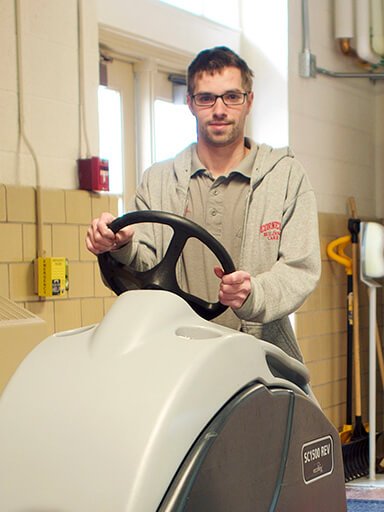Social Security makes every effort to ensure that any information published is accurate and up to date, but some information on this webpage may be historical.
Walter's Success Story: Home Sweet Home
Published in 2018
 It was "Take Our Sons and Daughters to Work Day" in 2002 when Walter first marveled at the campus where his mom worked. The bell tower, the scenic lawns, the stadium, and the bustling dining hall at Cornell University all felt alive. That day, Walter decided to find work on campus and contribute to the diverse fabric of Cornell's community.
It was "Take Our Sons and Daughters to Work Day" in 2002 when Walter first marveled at the campus where his mom worked. The bell tower, the scenic lawns, the stadium, and the bustling dining hall at Cornell University all felt alive. That day, Walter decided to find work on campus and contribute to the diverse fabric of Cornell's community.
As a child, Walter struggled in school. He was born with a developmental disability and had to work hard to acquire skills that came naturally to most of his classmates. Noise, chaos or crowding left him feeling overloaded and it was hard for him to concentrate. But Walter was unwilling to let his learning differences discourage him from achieving his goals, and he became accustomed to hard work.
As the end of high school approached, Walter was uncertain about whether there would be employment opportunities that suited him. He wanted to find work at a place like Cornell, become self-reliant and move into a home of his own one day.
For many adults with developmental disabilities, independent living is a tall order. For most, moving out on their own may not be a realistic goal until middle age. But Walter was armed with support from his family, guidance from community professionals, and a solid work ethic. He would not be like most.
A Challenge and a Ticket to Work
Because Walter's developmental disability was present from birth, he received Supplemental Security Income (SSI). He knew that depending on the cash payments would limit his options, so he set goals to find work and earn income. When a transition counselor at school referred him to Challenge Workforce Solutions (Challenge), a local provider of employment supports for job seekers with disabilities, Walter and his family were grateful for the guidance. With the right employment team in place, fall of 2009 marked the start of Walter's on-ramp to the workforce.
What are Work Incentives?
There are 24 Work Incentives designed to ease the transition into the workforce. Because each person's circumstances are different, people who want to explore employment are encouraged to connect with a Benefits Counselor – a trained professional who can advise job seekers about the effect that employment could have on their benefits. Some ENs have a Benefits Counselor on staff. Organizations known as Work Incentives Planning & Assistance (WIPA) projects also provide benefits counseling.
Walter was especially interested in making sure he would have healthcare if he went to work. Under the Medicaid While Working Work Incentive, your Medicaid coverage can continue after you start or return to work, even if your earnings become too high to receive SSI payments. To qualify, you must meet all eligibility rules, need Medicaid in order to work, and have gross earned income that is insufficient to replace SSI, Medicaid and publicly funded attendant care. A Benefits Counselor can explain these rules and help you determine whether you qualify for this Work Incentive. To find a Benefits Counselor, call the number listed at the end of this feature.
For more detailed information about this and other Work Incentives, visit choosework.ssa.gov/about/work-incentives.
Challenge, an Employment Network (EN), is one of many service providers around the country authorized to help people with disabilities prepare for, find and maintain employment through Social Security's Ticket to Work (Ticket) Program. This free and voluntary program supports career development for Social Security disability beneficiaries (age 18 through 64) who want to work. ENs offer a range of services such as career counseling, job search and placement assistance, job development and coaching services. Some ENs serve specific populations while others specialize in providing certain types of services, but all help people with disabilities progress toward financial independence.
What about my benefits?
Challenge began by helping Walter and his family understand how employment could affect his SSI and Medicaid benefits. They learned about Social Security Work Incentives, which make it easier for adults with disabilities to enhance their job skills and gain work experience, while still receiving Medicaid or Medicare and, in some cases, cash payments from Social Security. Thanks to a Work Incentive known as Section 1619b (Medicaid While Working), Walter's Medicaid coverage would continue even if his income was too high to receive an SSI cash payment.
Because of the Ticket Program and Work Incentives, Walter could focus on acquiring the skills he would need to be successful in the workforce.
Soft skills pay bills
Preparing for work with soft skills
You can be the best smoothie maker or coder in town. But it amounts to little if you don't work well with others. Some of the most important professional skills can't be measured. These traits are called soft skills and they're crucial to your success in the workforce. Some examples of soft skills include communication skills, teamwork, adaptability, problem solving and attitude.
To read more about soft skills and workforce readiness, visit youth.gov/feature-article/soft-skills-pay-bills. Soft Skills to Pay the Bills is a curriculum developed by the Office of Disability Employment Policy at the U.S. Department of Labor to help teach youth important skills for workforce readiness.
Walter's career counselor at Challenge helped him create an Individual Work Plan (IWP), which identified short- and long-term goals for Walter's work and earnings as well as supports and services that he and Challenge decided would help him make progress toward his goal and toward financial independence. They decided to start by having Walter work on "soft skills" during the first job that Challenge arranged for him as a dishwasher in the kitchens at Ithaca College.
Soft skills are professional qualities (other than technical ability) that are essential for long-term success in the workplace. People who are new to the workforce, like Walter was, often begin by working on professionalism – learning to dress properly for work, be on time consistently, follow directions, and cooperate and communicate well with supervisors, co-workers and customers.
With help from his job coach at Challenge, Walter learned to follow Ithaca College's attendance policies, work as part of a team, increase his adaptability, work more hours and increase his responsibilities. Along with dishwashing, Walter gained experience with custodial work, which interested him because he liked the variety of tasks that he did in different locations around campus. According to his career counselor at Challenge, once it became clear to Walter that he could do the job and grow with it, he developed enough confidence to believe that with effort, he would reach his goals. This was a turning point in the way Walter saw himself, and the possibilities for his future.
The Promised Quad
American Dream Employment Network
Some local providers like Challenge can focus on the direct support they give participants because they are part of a larger group of service providers and employers known as an "administrative EN." Administrative EN members work together to help people with disabilities succeed in the workforce.
In 2018, Walter's direct support services are still provided by Challenge, which is now part of a larger, administrative EN now known as "ADEN."
To learn more about ADEN and its member organizations, visit www.AmericanDreamEN.org.
 In 2014, after 5 years at Ithaca College, Walter and his counselor decided it was time to make the move to Cornell. Challenge helped him land a position as a dishwasher in Cornell's dining halls.
In 2014, after 5 years at Ithaca College, Walter and his counselor decided it was time to make the move to Cornell. Challenge helped him land a position as a dishwasher in Cornell's dining halls.
"When I first got over to Cornell, I had a job coach who came with me and made sure things went well," he recalls. "My job coach stayed for several months and now only checks in once a week. He helps me stay on track and gives me a lot of encouragement."
Walter proved he would make a valuable addition to the team that cares for Cornell's campus, was hired for a full-time position on the custodial staff.
Challenge is still by Walter's side to provide job coaching, help troubleshoot, and answer questions. He takes comfort in knowing he doesn't have to manage Social Security rules on his own.
Home
Now Walter feels at home on Cornell's campus. Strong performance reviews reflect his dedication and the connection he has with the people who frequent his work sites.
"For me, work is not all about the paycheck," he says. "It's about the other things that go with the job. I like being part of the Cornell community ... everyone is so nice. The surroundings are beautiful, and I've met people from many different cultures too. Now, I get to go to work every day in a place where I'm comfortable ... where I can be myself."
While working is more than just earning his paycheck, Walter acknowledges that having a job has given him options that work and earning an income offers. He now has private health insurance and a 401K retirement plan from his employer. Full-time employment has also helped Walter realize another big dream.
"I'm the first person in my family to be a homeowner!" he beams. "I was scared about getting my own place at first because I wasn't sure whether I could afford it or if I would be able to keep things in order. Once I went through the process of getting a loan with help from my dad, I felt proud and happy that I was able to reach another goal in my life ... and I now live in my own home that I bought for myself!"
Ticket to Work and Work Incentives helped Walter find his path to a better future. Find yours.
To learn more, call the Ticket to Work Help Line at 866-968-7842 or 866-833-2967 (TTY), or visit choosework.ssa.gov.